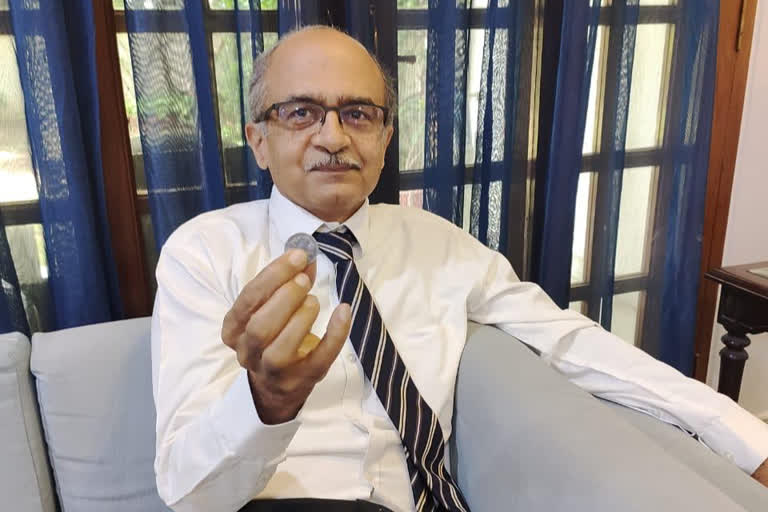New Delhi: Activist-lawyer Prashant Bhushan, convicted and awarded one rupee fine for his contemptuous tweets against the judiciary, on Saturday moved the Supreme Court seeking the right of appeal against convictions in original criminal contempt cases to be heard by a larger and a different bench.
Bhushan on August 31 was directed to deposit the fine with the Supreme Court registry by September 15 and failure to comply would entail a three-month jail term and debarment from law practice for three years.
In a fresh plea filed through lawyer Kamini Jaiswal, he has sought a declaration that a "person convicted for criminal contempt by this court, including the petitioner herein, would have a right to an intra-court appeal to be heard by a larger and different bench".
Bhushan, in the plea, suggested procedural changes to reduce the chances of "arbitrary, vengeful and high-handed decisions" in criminal contempt cases saying that in such cases the top court is the aggrieved party, the "prosecutor, the witness and the judge" and hence they raise fear of inherent bias.
The petition said the right of appeal is a fundamental right guaranteed under the Constitution and is also guaranteed under international law and this would act as a "vital safeguard against wrongful conviction and would truly enable the provision of truth as a defence".
ALSO READ: 'Bhushan should go for review in larger interest'
The plea, to which the Ministry of Law and Justice and the Registrar of the apex court have been made parties, has also sought a direction for framing rules and guidelines "providing for intra-court appeal against conviction in original criminal contempt cases".
Under the present statutory scheme, a person convicted for the criminal contempt has the right to file a review petition against the judgement and that plea is decided in chambers by the bench usually without hearing the contemnor.
Bhushan said his petition has been filed for the enforcement of fundamental rights guaranteed under Articles 14 (right to equality), 19 (Freedom of speech and expression) and 21 (right to life) of the Constitution.
"That the existing Act and Rules, do not bar or prohibit the prayers as sought by the Petitioner. In fact, it is in the spirit of the Contempt of Courts Act, 1971 to lay down such a procedure. This Hon'ble Court has in the past framed special rules to deal with cases concerning the death penalty and has also devised special remedy in the nature of 'curative petition' against a final judgment of the Supreme Court on certain limited grounds," it said.
The plea said it has been filed in order to bring important procedural safeguards when the top court considers cases of criminal contempt in original proceedings that is those proceedings where it does not act as an appellate court.
ALSO READ: 'By censuring criticism, courts cannot win confidence of people'
